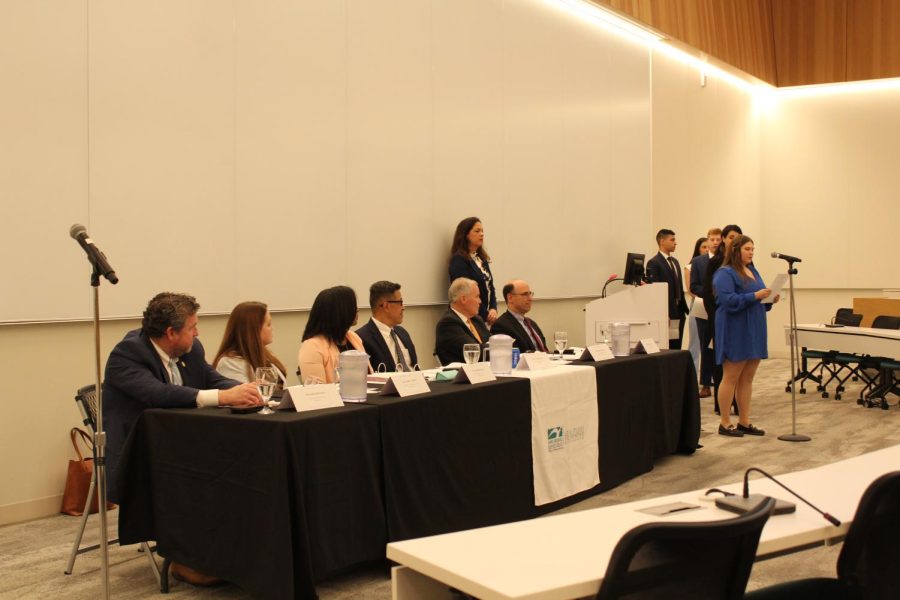Members of Maryland judiciary system speak on 1st Amendment
Paralegal students ask members of the Maryland judiciary questions at the Forum on the Judiciary event on Thursday.
April 24, 2023
Six members of the Maryland judiciary system discussed the extent of the press’ First Amendment right to broadcast court proceedings on Thursday.
The panel consisted of four judges: John Morrissey, Richard D. Bennett, Gregory Wells and Elizabeth Morris. Sandra F. Howell, a magistrate in the Circuit Court for Anne Arundel County, and Justice Jonathan Biran of the Supreme Court of Maryland also spoke on the panel.
Howell pointed out the impact livestreaming court proceedings has on victims.
“Victimization prevents people from disclosing, and having a publicly broadcast trial could have an impact upon victims of offenses,” Howell said at the event hosted by AACC’s Legal Studies Institute. “Every time I had to prepare a victim for trial, I had to describe the open-for-public trial [and] who might be in there seeing, hearing and listening to the testimony, which presented a lot of difficulty for victims in summoning that courage to get through a trial.”
The speakers discussed how courtrooms adapted to new uses of technology such as body camera footage and videos taken by witnesses, and explained how they impacted court proceedings.
Howell said body camera footage “presents now a completely different aspect of hearing a case and making the decision. You’re able to better make a credibility determination about what happened that way you can not only hear about it, but you can see it.”
Bennett ruled in favor of the media being able to broadcast recordings of courtroom proceedings in the case of National Public Radio v. Klavans, which challenged Maryland’s broadcast ban–a law which prevented media organizations from broadcasting courtroom proceedings.
Elizabeth Morris, the first Black woman to be a judge in the Circuit Court of Maryland, said “the court system, when you’re dealing with citizens, should absolutely be reflective of the people that we are part of the community. Because that just really increases the public’s faith and confidence in the justice system.”
Mary Bachkosky, an associate professor in AACC’s Legal Studies Institute, said it was exciting to see her students get to hear from people with experience in the legal system.
“They get to see judges in person talk about real, substantial issues that we’ve talked about in theory in the classroom,” Bachowsky said. “They get to hear them discuss them in terms of real cases that have been presented in front of them.”
Second-year business administration student David Black said the press should have some responsibility when it comes to covering court cases.
“They [the press] inform everyday people like me who are at home and who are not able to make it to court proceedings,” Black said.
He added: “Even though I’m a business administration student, I never really have taken any courses covering law. It was a really good event. I learned about the First Amendment and when it is constitutional. … Overall, great event.”












